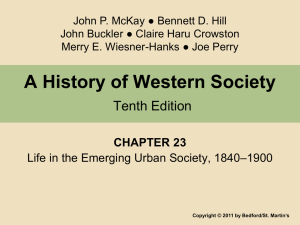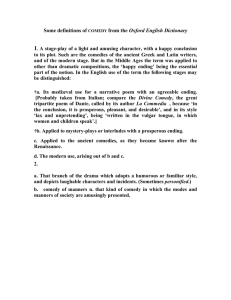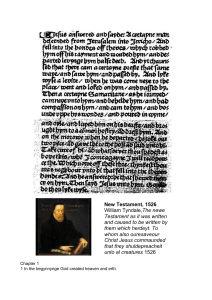TEXTS AND CONTEXTS: The Taming of the Shrew
advertisement
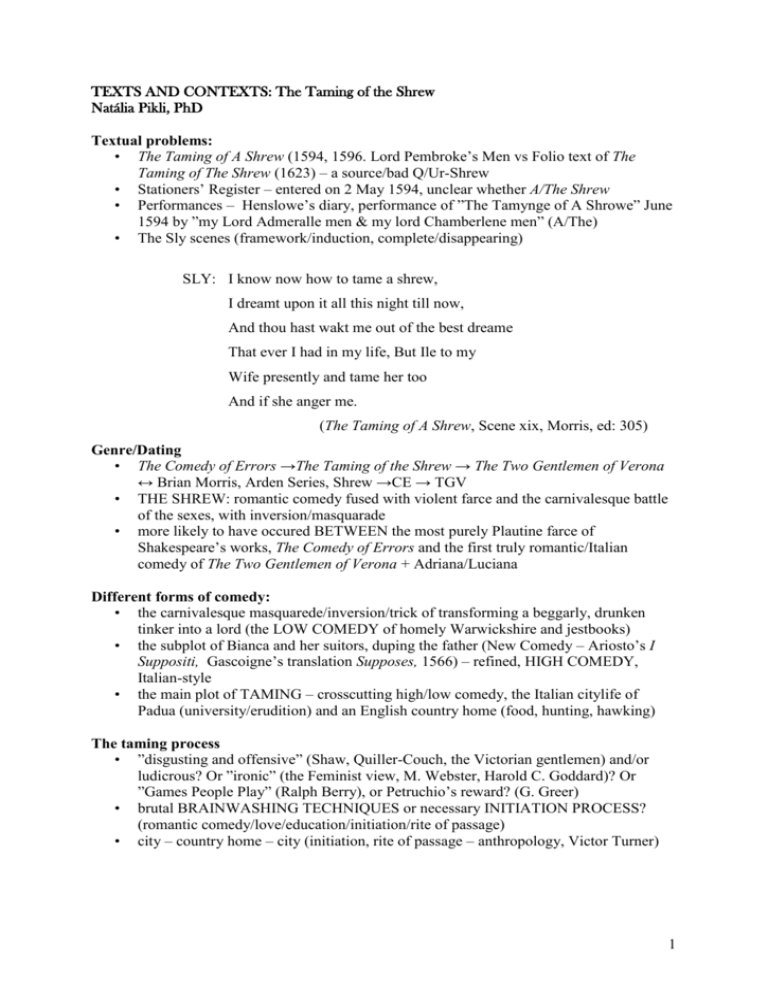
TEXTS AND CONTEXTS: The Taming of the Shrew Natália Pikli, PhD Textual problems: • The Taming of A Shrew (1594, 1596. Lord Pembroke’s Men vs Folio text of The Taming of The Shrew (1623) – a source/bad Q/Ur-Shrew • Stationers’ Register – entered on 2 May 1594, unclear whether A/The Shrew • Performances – Henslowe’s diary, performance of ”The Tamynge of A Shrowe” June 1594 by ”my Lord Admeralle men & my lord Chamberlene men” (A/The) • The Sly scenes (framework/induction, complete/disappearing) SLY: I know now how to tame a shrew, I dreamt upon it all this night till now, And thou hast wakt me out of the best dreame That ever I had in my life, But Ile to my Wife presently and tame her too And if she anger me. (The Taming of A Shrew, Scene xix, Morris, ed: 305) Genre/Dating • The Comedy of Errors →The Taming of the Shrew → The Two Gentlemen of Verona ↔ Brian Morris, Arden Series, Shrew →CE → TGV • THE SHREW: romantic comedy fused with violent farce and the carnivalesque battle of the sexes, with inversion/masquarade • more likely to have occured BETWEEN the most purely Plautine farce of Shakespeare’s works, The Comedy of Errors and the first truly romantic/Italian comedy of The Two Gentlemen of Verona + Adriana/Luciana Different forms of comedy: • the carnivalesque masquarede/inversion/trick of transforming a beggarly, drunken tinker into a lord (the LOW COMEDY of homely Warwickshire and jestbooks) • the subplot of Bianca and her suitors, duping the father (New Comedy – Ariosto’s I Suppositi, Gascoigne’s translation Supposes, 1566) – refined, HIGH COMEDY, Italian-style • the main plot of TAMING – crosscutting high/low comedy, the Italian citylife of Padua (university/erudition) and an English country home (food, hunting, hawking) The taming process • ”disgusting and offensive” (Shaw, Quiller-Couch, the Victorian gentlemen) and/or ludicrous? Or ”ironic” (the Feminist view, M. Webster, Harold C. Goddard)? Or ”Games People Play” (Ralph Berry), or Petruchio’s reward? (G. Greer) • brutal BRAINWASHING TECHNIQUES or necessary INITIATION PROCESS? (romantic comedy/love/education/initiation/rite of passage) • city – country home – city (initiation, rite of passage – anthropology, Victor Turner) 1 Bishop’s Bible, 1568 – two views on marriage St. Paul’s Epistles to the Ephesians, Book of Ephesians, 6 and 5. 5. 6. 1 Chyldren, obey your fathers and mothers in the Lorde: for this is ryght. 2 Honour thy father and mother (whiche is the first commaundement in promise) 3 That thou mayest prosper, and lyue long on earth. 4 Fathers prouoke not your children to wrath: but bring them vp in instruction and information of the Lorde. 5 Seruauntes obey them that are your bodyly maisters, with feare and tremblyng, in singlenesse of your heart, as vnto Christe. 6 Not with seruice vnto the eye, as men pleasers: but as the seruautes of Christ. 7 Doyng the wyll of God fro the heart, with good wyll seruyng the Lorde, and not men: 8 Knowyng, that whatsoeuer good thyng any man doeth, that shall he receaue agayne of the Lorde, whether [he be] bonde or free. 9 And ye maisters do the same thynges vnto them, puttyng away threatnyng: knowyng that your maister also is in heauen, neither is respecte of person with hym. 21 Submittyng your selues one to another in the feare of God. 22 Wyues, submit your selues vnto your owne husbandes, as vnto the Lorde: 23 For the husbande is the head of the wyfe, euen as Christe is the head of the Church: & he is the sauiour of the bodie. 24 But as the Church is subiect to Christ, lykewyse the wyues to their owne husbandes in all thynges. 25 Ye husbandes loue your wyues, euen as Christe also loued the Churche, and gaue hym selfe for it, 26 To sanctifie it, clensyng [it] in the fountayne of water in the worde, 27 To make it vnto hym selfe a glorious Churche, not hauyng spot or wrinckle, or any such thyng: but that it should be holy, and without blame. 28 So ought men to loue their wyues, as their owne bodies. He that loueth his wyfe, loueth hym selfe. 29 For no man euer yet hated his owne flesshe: but norissheth & cherissheth it, euen as the Lorde the Churche. 30 For we are members of his body, of his flesshe, and of his bones. 31 For this cause shall a man leaue father and mother, and shalbe ioyned vnto his wyfe, and two shalbe made one flesshe. 32 This is a great secrete: but I speake of Christe and of the Churche. 33 Therfore euery one of you [do ye so] Let euery one of you loue his wyfe euen as hym selfe, and [let] the wyfe reuerence her husbande. ETYMOLOGY AND POPULAR ANIMAL LORE • Edward Topsell, The Historie of Four-Footed Beasts, 1607 ”a rauening beast feygning it selfe to be gentle and tame, but being touched it biteth deepe, and poisoneth deadly”, ”a cruel mind” not loved as ”feared of al” if killed : to ”cure her owne bites” OED: • ‘shrew’ – 13th c. animal, 14th c. ‘wicked, evil-disposed man’ ‘the Devil’, by Chaucer’s time ‘such a woman’; Holinshed, 1587, ‘These are some of the policies of such shrews or close booted gentlemen’, or Dekker, 1609, ‘Such as were shrewes to their wiues’ 2 PROVERBS (Dent, R.W. Shakespeare’s Proverbial Language. An Index /Berkeley, 1981/) • To play the woman – to play the fool, counterfeit, dissemble • A woman say nay, and means aye • A woman’s strength is in her tongue (also in RII) • Women are in church saints, abroad angels, at home devils. (… and apes in your bed, Middleton) • Women will have their wills (also in CE, JC, Cym, Sonn.) • Wedding and hanging go by destiny (MV, TN, 2H6, RJ) • Marrying is marring (MWW, AWW, RJ) • Maidens should be seen and not heard (MV) ’CHIDING WOMAN’ in the Bible (influential translations of the 16th-17th century: Miles Coverdale Bible, 1535, Bishop’s Bible, 1568, King James Bible, 1611) - The Book of Proverbs warns against the brawling, troublesome, chiding, angry, contentious woman; the flattering tongue of the straunge woman, affirming that a foolish woman is clamorous. The most famous and characteristic verses from the Bishop’s Bible may sum up this attitude: ‘It is better to sit in a corner upon the house toppe, then with a brawling woman in a wide house’ (Pr 21:9), ‘It is better to dwell in the wyldernesse, then with a chydyng and angrye woman’ (Pr 21:19). JESTBOOK → EMBLEM BOOK A popular jestbook, Tales and Quick Answers, c. 1567: about a husband seeking his lost wife upstream, saying that her contrariness made her drowned body swim againts the tide, appears in Whitney, A Choice of Emblems, 1586, page 158 (Post fata: uxor morosa, etiam discors). COLASMVS wife, in raging flood was drown’d Who longe did ſeeke her corpes, againſt the ſtreame: His neigbours thought his ſences were not ſound And did deride his madnes moſt extreme: Who call’d aloude, thy wife beneath did fall Then dounwarde ſeeke, or ſeeke thou not at all. To whome, quoth he, the place belowe I ſee, Yet in her life, gainſt reaſon ſhe did ſtrive: And contrarie to euerie one, woulde bee; Wherefore, I knowe this way ſhe needes muſt driue Then leaue, quoth they, and let her ſtill be drown’d, For ſuch a wife is better loſt then founde 3 OTHER CONTEXTS: (for next class read: Here Begynneth a Merry Jest of a Shrewd and Curste Wyfe, Lapped in Morelles Skin, for Her Good Behavyor, printed by Hugh Jackson, 1550, at http://www.luminarium.org - use the search engine or drop me a line if you’re not successful) - popular festivals: Maid Marian and Marion of the Morris, Hocktide, Lord of Misrule - popular shaming rituals: carting, Skimmington ride, scold’s bridle, ducking of a scold (witchcraft) - conduct books on household management (wives’ behaviour, duties, wifetaming/horse-taming) - sermons, homilies (marriage) - Humanist views - education of women (Vives, Erasmus) - crab-tree lectures and popular ballads or broadsheets - French fablieaux vs English tradition of shrews (mystery plays – Noah’s Wife, Chaucer: Wife of Bath) - emblem books – changes (and constants) in views on women from Whitney, 1586 to Peacham, 1612 4
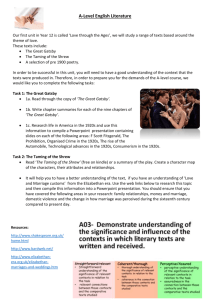
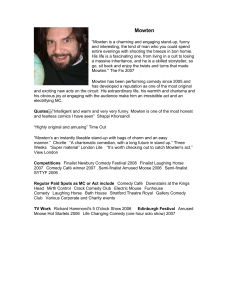
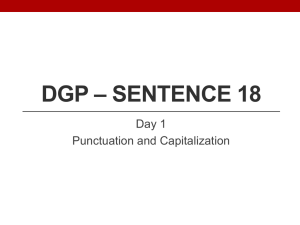
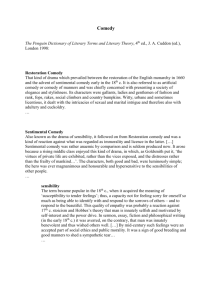
![Summer Reading: [All books are the unabridged versions] Class](http://s3.studylib.net/store/data/006936044_1-f6368b3af66ab917fa4697494ea2bdf7-300x300.png)
